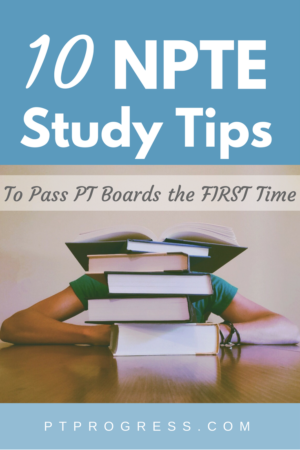
So you’re about to start studying for the NPTE. You’ve just spent three years in PT School and now it’s time to test your knowledge with a 250 question test. Here are 10 tips to pass the NPTE the first time.
1. Create a Study Calendar and Stick to It
Give yourself the best opportunity to pass by setting goals to review content. When I started studying for boards, the first thing that I created was a study calendar. I go into a lot of detail on how to create a study calendar and even share the exact calendar I used as well as a blank template so you can modify it based on your study preferences.
2. Use a Boards Book or Two
Most people use just one boards book, but looking at a second boards book might not be a bad idea. Everyone has a different way of processing information, so if an outline format doesn’t sit well with you, consider a book with a few more images or paragraph layout. You don’t need to study both books – but definitely study one of the books very, very well.
3. Focus On What Matters
The NPTE has 200 questions and 75% of them are on the BIG Three topics: Musculoskeletal, Neuromuscular / Nervous System, Cardiopulmonary & Lymphatics. The rest of the areas are important to study as well, but focus on the Big Three areas, especially if of of them is a weakness for you. I’d also recommend reading the FSBPT NPTE breakdown carefully before you start studying.
4. Consider Taking an Online Prep Course
I took an online NPTE prep course about 8 weeks before I sat for the NPTE. I felt that it was helpful because it gave me a different perspective and gave me some variety in the way I studied. If you need a little extra accountability or support, you might look into an online NPTE prep course.
5. Find a Distraction Free Environment
I designated a set time each night to study. It was usually between 6pm and 9pm. I studied best at home at my desk, but making sure all distractions were turned off was really helpful. For me, I eliminated all distractions by deleting all social media apps from my phone and kept my computer shut unless I was taking a practice exam or looking up a concept online for more clarity. Do whatever it takes to set up a distraction free environment.
6. Get Up and Move Every Hour
You’re about to be a PT! Don’t just sit for 3 hours a day hunched over a book. Get up and walk around. Do some pushups or squats. Get your blood flow going. Speaking of blood flow, When blood leaves the right atrium, what valve must it pass through to enter the right ventricle?
7. Take Multiple Practice Tests
In my boards study calendar, I set aside time to take 8 different practice exams. I know others who took 4-5 practice exams and did very well on the NPTE. Regardless of the number of practice exams you take, you need to review them appropriately. Take the time to really understand why you got the question wrong. Did you read the question wrong? Did you confuse the answers? Was your answer a guess? Did you second guess yourself?
Also, you’ll definitely want to purchase the PEAT – these are retired exams from FSBPT and well worth the $99 it costs to purchase the exams. Also, per the FSBPT website, 99.3% of people who scored over 600 on the PEAT passed the boards. It’s a great resource to make sure you are on track with your studying.
8. Use PQ4R method of studying
A Berkely review on how we learn highlighted a concept called PQ4R.
- Preview – Skim the area you’re about to study. Briefly look at the headings and bolded items to create a schema or map.
- Query – Make a mental note of questions you might have about the topics you’re about to study.
- Read – Read carefully. Do not skim (that’s what the preview was for!) Read with the intention of finding the answers to the questions you formed while previewing the material.
- Reflect – After you read each section, honestly assess if you understand the material.
- Recite – Can you recall the material? If you can explain it, you probably understand it!
- Review – Take the time to go back to the material you’ve just learned. This will reinforce the new items and will be easier to build on it as you continue to study.
9. Ask others to quiz you.
I wasn’t a group studier, but I did find value in explaining concepts to my friends and classmates whenever possible. Sometimes I would arrive to class 20 minutes early and write out a process on a whiteboard, explaining a concept to another classmate. They would try to do the same, which was helpful for me to hear their take on the material.
10 Breathe.
Don’t forget to breathe. Seriously, studying for a big exam is stressful. This gif is a little old now, but I think it’s still helpful. When you find yourself stressed about your score or how soon boards are, pull up this app and breath to the box expanding and collapsing. Give it a try.


